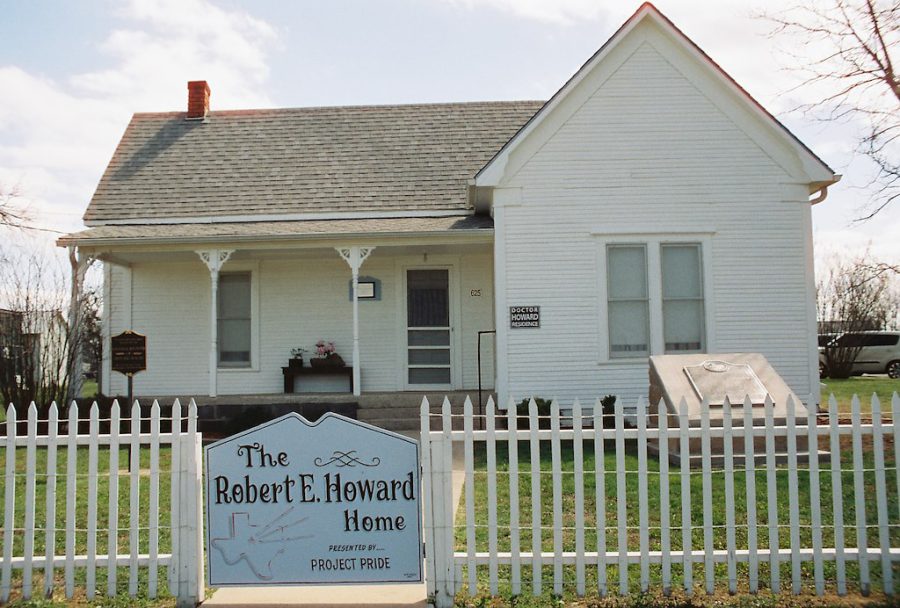Museum celebrates author Robert E. Howard
Project Pride and the Robert E. Howard Museum present annual Howard Days April 28-29 in Cross Plains, Texas.
April 5, 2023
Brick buildings, small businesses and grass could describe almost any small town in Texas. One particular town in West Texas sets itself apart from the others. Cross Plains, Texas, is a town with a population just shy of 1,000 people.
What this town has that others do not is a different kind of history. Cross Plains is where the father of sword and sorcery was raised. His name was Robert Ervin Howard.
Howard was born on Jan. 22, 1906. Howard loved reading and writing and found school to be joyless. He grew up with the same small-town Texas attitude many at the time possessed, but also constantly found himself at a crossroads between living in a small town and loving fantasy.
He did not grow up around people who thought about the same things. Howard also enjoyed boxing and became an amateur boxer. With these different inspirations, Howard eventually became a professional writer.
Howard and his family moved to Cross Plains in 1919 when he was 13 years-old. Howard submitted stories to magazines, although most of them were rejected. Eventually, by the early 1930s, he was submitting stories to Weird Tales, a pulp magazine. Around this time, Howard took a trip to South Texas where he wrote his most famous poem, “Cimmeria,” and conceived the character of Conan the Barbarian. Howard wrote more than 800 poems.
One of the most important people in Howard’s life was his mother, Hester. She instilled a love for poetry and literature in her son and supported his writings. She was the biggest influence on him as he grew up. When her health declined in 1936, so did Howard’s. He died by suicide in the summer of 1936 when he found his mother could not wake from her coma.
Howard’s success came after his passing. The “Conan the Barbarian” series was republished in the late 1960s, leading to a popularity uptick in the 1970s known as the “First Howard Boom.”
The “Second Howard Boom” occurred during the early 21st century when new collections of Howard’s works were printed with restored, original text.
This boom had a movie released in 2011 about his character Conan. The characters of Kull the Conqueror and Solomon Kane also received movie adaptations, in 1997 and 2009 respectively.
Howard’s house in Cross Plains is still standing today, and was converted into the Robert E. Howard Museum. The museum is part of the National Register of Historic Places. It is fully owned and maintained by Project Pride, a nonprofit organization that encourages residents and businesses in Cross Plains to clean up their yards or business premises. Project Pride bought the home in 1989.
Arlene Stephenson, the president of Project Pride, said Project Pride wanted Cross Plains to look more attractive than other small towns.
“Cross Plains is at a main intersection of two busy highways.” Stephenson said. “A lot of traffic comes through here. We also wanted to retain the history of our area.” Project Pride had to completely restore the house to how it originally looked. Lots of research went into the effort.
The museum has become increasingly popular in the Robert E. Howard community. People from all over the world come to visit the museum.
Stephenson said, “We find it almost impossible to believe that somebody from overseas would be so excited that they would make this the focal point of their trip to the U.S.” There is even a German professor of American literature named Dierk Gunther from the University of Tokushima in Japan who comes to the museum.
Project Pride hosts a yearly event known as Howard Days at the museum to honor the life and legacy of Robert E. Howard.
Howard Days is typically in June, but this year it will be held on April 28-29.
The event has many activities including a Cross Plains walking tour, as well as panels with guest speakers and a keynote speaker. The library also displays original Robert E. Howard typescripts and original Weird Tales magazines.
One of the most interesting things that happens during Howard Days is when attendees go to the front of the museum and read Howard’s poem, “Cimmeria,” in their native language.
There have been as many as nine different native speakers reading the poem. “We have had people from Russia, Norway, Germany, Ireland and Japan all read the poem,” Stephenson said. “People have also read it in Gaelic, Latin and even Old English.”


